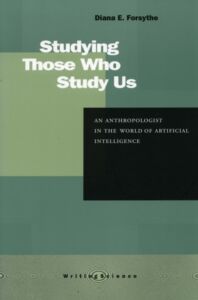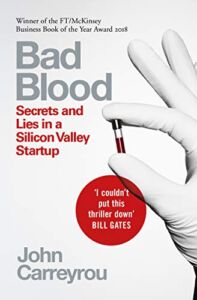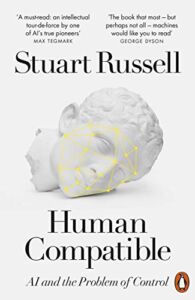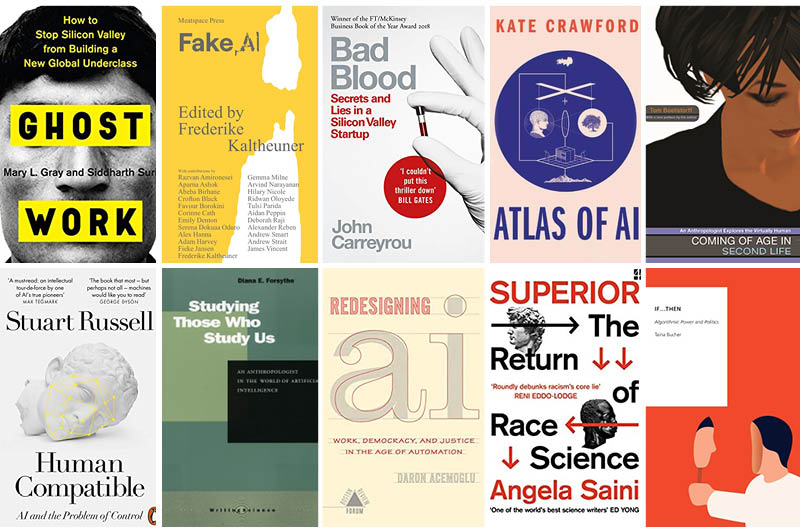
Our recommended reads for 2021
Our tradition of recommending books began with a list in the Delegate Pack for our inaugural event in 2019 that were relevant to the conference theme: socially-responsible AI.
Each year the books we select aren’t necessarily the most recently published, they’re simply books we feel, if you’re interested in socially-responsible tech, are worthy of a place on your bookshelf. Case in point: On our 2021 list is a book by an anthropologist writing about artificial intelligence over 30 years ago.
And if that’s not enough books for you, check out the ones we recommended in 2020 here.
IF…THEN. Algorithmic Power and Politics. By Taina Bucher
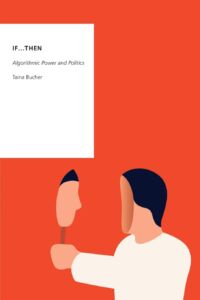 Taina Bucher is a media scholar at the University of Oslo. In March we interviewed her for the Response-ability.tech podcast. In her book, Bucher proposes that we must approach algorithms not by asking what is an algorithm but instead when and how are algorithms. She also finds the black box metaphor problematic and asks “what is at stake in framing algorithms in this way and what such a framing might possibly distract us from asking”.
Taina Bucher is a media scholar at the University of Oslo. In March we interviewed her for the Response-ability.tech podcast. In her book, Bucher proposes that we must approach algorithms not by asking what is an algorithm but instead when and how are algorithms. She also finds the black box metaphor problematic and asks “what is at stake in framing algorithms in this way and what such a framing might possibly distract us from asking”.
Bucher uses case studies such as the Facebook ‘trending topics’ controversy in 2016 as an example of the lack of nuance in discussions around attributing agency to either algorithms or humans. It’s a brilliant and thought-provoking book, and a must-read for anyone who wants a deeper, more nuanced discussion about algorithms whose power “can be felt in all spheres of society”.
Coming of Age in Second Life. An Anthropologist Explores the Virtually Human. By Tom Boellstorff
 With the word ‘metaverse’ everywhere at the moment, Tom Boellstorff’s 2008 anthropological study of Second Life, a virtual world which was owned and managed by Linden Labs, feels very relevant again today.
With the word ‘metaverse’ everywhere at the moment, Tom Boellstorff’s 2008 anthropological study of Second Life, a virtual world which was owned and managed by Linden Labs, feels very relevant again today.
Unique at the time, certainly for a study of Internet culture, Boellstorff showed how anthropology might contribute to understanding culture in virtual worlds by undertaking his fieldwork entirely inside Second Life. Boellstorff did this to show that studying virtual worlds in their own terms was not only feasible but crucial to developing research methods that keep up with the realities of technological change.
This book will appeal to anyone interested in virtual worlds (defined as computer-generated physical spaces that can be experienced by many people at once) which are places of human culture realised by computer programs through the Internet. Boellstorff’s ethnography shows that “what happens in virtual worlds often is just as real, just as meaningful” to people as experiences that take place offline.
Studying Those Who Study Us. An Anthropologist in the World of Artificial Intelligence. By Diana E. Forsythe
Diana E. Forsythe was a leading anthropologist of science, technology, and work, and especially of the field of artificial intelligence. This book collects her best-known essays, along with other major works that remained unpublished upon her death in 1997.
Forsythe did extensive fieldwork in medical informatics and AI during the 1980s and 1990s, a period when AI enjoyed a highly privileged position in computer science. As a result of her fieldwork, Forsythe developed an understanding of the culture of AI research, and some of the essays in this book show how the assumptions of AI researchers limit their horizons of understanding and lead to problems with the systems they build.
Forsythe’s essays also reveal her experiences of working with those in the AI community. At first her ethnographic work was marginalised by the AI researchers in design projects but once social science perspectives and methods were recognised and accepted as useful, the engineers appropriated ethnography for themselves. Taken as a whole, the essays have enduring value for anthropologists and other social scientists working in the field of artificial intelligence, and digital systems more broadly.
Redesigning AI. Work, Democracy, and Justice in the Age of Automation (Boston Review)
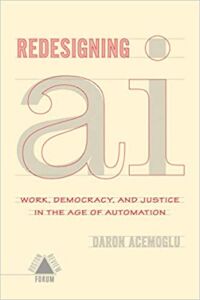 As we know, artificial intelligence is already making huge advances—revolutionizing medicine and transport, transforming jobs and markets, and reshaping the fabric of social life. At the same time, the promises of AI have been increasingly overshadowed by its perils, from automation and disinformation to powerful new forms of bias and surveillance. Reckoning with these threats to work, democracy, and justice, Redesigning AI asks what can be done to redirect AI for the good of everyone.
As we know, artificial intelligence is already making huge advances—revolutionizing medicine and transport, transforming jobs and markets, and reshaping the fabric of social life. At the same time, the promises of AI have been increasingly overshadowed by its perils, from automation and disinformation to powerful new forms of bias and surveillance. Reckoning with these threats to work, democracy, and justice, Redesigning AI asks what can be done to redirect AI for the good of everyone.
Leading off a forum, economist Daron Acemoglu argues that the challenges are serious, the future is not settled, a case also made by our 2021 keynote, sociologist Susan Halford. Just as technological development promoted broadly shared gains in the three decades following World War II, so AI can create inclusive prosperity and bolster democratic freedoms. Setting it to that task won’t be easy, but it can be achieved through government policy and regulation, the redirection of industry norms, and robust democratic oversight.
Respondents including Abebe, Benanav, Crawford, and Susskind broaden the conversation, tacking issues such as decolonising AI and current workplace AI. The essays that follow include “Stop Building Bad AI” by Annette Zimmerman who challenges the belief that something designed badly can later be repaired and improved. Together the perspectives sketch an urgent vision for redirecting the course of technological change to achieve better societal outcomes in the long term.
Bad Blood. Secrets and Lies in a Silicon Valley Startup. By John Carreyrou
Elizabeth Holmes, founder of the blood testing company, Theranos, is currently standing trial for wire fraud. As Carreyrou explains in this riveting account of ambition and hubris, “by bringing criminal charges” against Holmes and her co-founder, Balwani, “federal prosecutors sent a message to all Silicon Valley entrepreneurs: No longer would serious misconduct be tolerated under the guise of innovation.”
In 2014, Theranos founder and CEO Elizabeth Holmes was widely seen as the female Steve Jobs: a brilliant Stanford dropout whose startup “unicorn” promised to revolutionise the medical industry with a machine that would make blood testing significantly faster and easier. Backed by investors such as Larry Ellison and Tim Draper, Theranos sold shares in a fundraising round that valued the company at more than $9 billion, putting Holmes’s worth at an estimated $4.7 billion. There was just one problem: The technology didn’t work.
A story of the biggest corporate fraud since Enron, this book underscores, as Johannes Lenhard explained on our podcast, the fact that much more scrutiny into venture capital investors is needed: They “are the ones deciding the big tech companies…scrutinizing them now has an impact on everything in the future”.
Atlas of AI by Kate Crawford
 What happens when artificial intelligence saturates political life and depletes the planet? How is AI shaping our understanding of ourselves and our societies? Drawing on more than a decade of research, sociologist Kate Crawford reveals how AI is a technology of extraction: from the minerals drawn from the earth, to the labor pulled from low-wage information workers, to the data taken from every action and expression.
What happens when artificial intelligence saturates political life and depletes the planet? How is AI shaping our understanding of ourselves and our societies? Drawing on more than a decade of research, sociologist Kate Crawford reveals how AI is a technology of extraction: from the minerals drawn from the earth, to the labor pulled from low-wage information workers, to the data taken from every action and expression.
The book reveals how this planetary network is fueling a shift toward undemocratic governance and increased inequity. Rather than taking a narrow focus on code and algorithms, Crawford offers a material and political perspective on what it takes to make AI and how it centralizes power.
Ghost Work. How to Stop Silicon Valley from Building a New Global Underclass. By Mary L. Gray and Siddharth Suri
Anthropologist Mary L. Gray and computer scientist Siddharth Suri reveal how services delivered by companies like Amazon, Google, Microsoft, and Uber can only function smoothly due to the blending of computation with the creativity and dynamism of human insight and judgment. Often intentionally hidden, there are millions of humans behind the seemingly automated systems we all take for granted.
These hidden humans-in-the-loop perform high-tech piecework: flagging X-rated content, proofreading, designing engine parts, and much more. They usually earn less than legal minimums for traditional work, they have no health benefits, and they can be fired at any time for any reason, or none.
By conducting one of the most comprehensive studies of its kind, Gray and Suri learned about the range of ghost work and the lives of people doing it. Ghost Work is the first book to illuminate ghost work’s role in building artificial intelligence and the lives of the workers who are invisible yet central to the functioning of the internet and the future of automation.
Fake AI. Edited by Frederike Kaltheuner
 Fake AI is an intervention.
Fake AI is an intervention.
From predicting criminality to sexual orientation, fake and deeply flawed Artificial Intelligence (AI) is rampant. Amidst this feverishly hyped atmosphere, this book interrogates the rise and fall of AI hype, pseudoscience and snake oil. Bringing together different perspectives and voices from across disciplines and countries, it draws connections between injustices inflicted by inappropriate AI.
Each chapter unpacks lazy and harmful assumptions made by developers when designing AI tools and systems, and examines the existential underpinnings of the technology itself to ask: why are there so many pointless, and even dangerously flawed, AI systems?
Contributors include Arvind Narayanan, Abeba Birhane, Deborah Raji, Gemma Milne, and Corinne Cath-Speth (who we interviewed on the podcast).
Human Compatible. AI and the Problem of Control. By Stuart Russell
Creating superior intelligence would be the biggest event in human history. Unfortunately, according to the world’s pre-eminent AI expert, Professor Stuart Russell, it could also be the last. In this very readable book, Russell sets out why he has come to consider his own discipline an existential threat to humanity, and how we can change course before it’s too late.
Russell gave this year’s BBC Reith Lectures on Living With Artificial Intelligence, which explore the impact of AI on our lives and discuss how we can retain power over machines more powerful than ourselves.
In his book, Russell explains how AI actually works and its enormous capacity to improve our lives—and why we must never lose control of machines more powerful than we are. Russell contends that we can avert the worst threats by reshaping the foundations of AI to guarantee that machines pursue our objectives, not theirs.
Superior. The Return of Race Science. By Angela Saini
Thanks to the work by scholars such as Benjamin, Eubanks, O’Neil, and Noble, we know that automated decision-making, search engines, and emerging technologies all reinforce racism. Coupled with the fact that in an age of identity politics, DNA ancestry testing, and the rise of the far right, a belief in biological differences between populations is experiencing a resurgence, which is cause for deep concern.
As such Angela Saini’s book, which aims to debunk the lies around race science, is urgent reading given that notions of superiority and inferiority impact us in different ways. Biologically we’re all pretty much all the same beneath the skin, Saini notes, yet race science still persists in the twenty-first century, despite everything that happened in the twentieth century.
What became clear to Saini through her research and investigative journalism was that “key to understanding the meaning of race is understanding power. When you see how power has shaped the idea of race and continues to shape it, how it affects even the scientific facts, everything finally begins to make sense”. A deeply unsettling read but a very necessary one.
The Response-ability Summit, formerly the Anthropology + Technology Conference, champions the social sciences within the technology/artificial intelligence space. Sign up to our monthly newsletter and follow us on LinkedIn. Watch the talks from our events on Vimeo. Subscribe to the Response-ability.tech podcast on Apple Podcasts or Spotify or wherever you listen.

